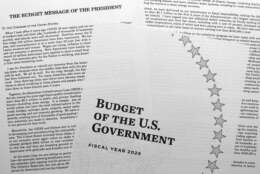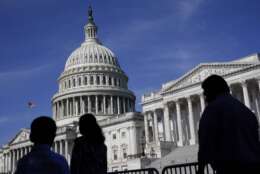Management
-
The release of a White House budget proposal resembles nothing so much as the drop of a hockey puck. Now comes the nasty scrambling. An enacted 2024 budget will take months, and probably occur after the fiscal year starts.
March 13, 2023 -
In today's Federal Newscast: Sexual harassment is on the rise at the Naval and Air Force Academies. The Department of Veterans Affairs is looking to hire nearly a half million new employees. And 'double back pay' gets double the rejection by a federal appeals court.
March 13, 2023 -
Office of Personnel Management’s monthly average processing time is down for the first time in almost 2 years.
March 10, 2023 -
The Department of Veterans Affairs, facing an increased workload as more veterans seek VA health care and benefits, is prepared to significantly staff up under the Biden administration’s fiscal 2024 budget request.
March 10, 2023 -
The House Oversight and Accountability Committee pressed Office of Personnel Management Director Kiran Ahuja on federal telework, hiring process reforms, the Federal Employees Health Benefits Program, the retirement case backlog and much more.
March 10, 2023 -
Rhode Island officials have deployed a way to streamline identity management for businesses and individuals. It promises to make life easier for government and its constituents.
March 10, 2023 -
The National Science Foundation, as listeners of this podcast heard from director Sethuraman Panchanathan the other day, received a new billion dollars in funding from the Chips Act. To help deal with a record budget, NSF is adding a new office called the Office of Business Information Technology Services, or BITS.
March 10, 2023 -
Without using the manufacturing capacity of allied nations, the United States probably cannot fill its own national security needs. One reason, according to a study by Bloomberg Government, is the apparent shortage of skilled manufacturing labor in the U.S.
March 10, 2023 -
The Biden administration is calling on agencies to step up their efforts to improve customer experience across government by bringing in additional experts and making better use of customer feedback data.
March 09, 2023 -
Critics of telework often point to its limitations on collaboration. Video meetings have replaced the conference table for millions of teleworkers, but they can be annoying. Earlier, Tom Temin spoke with the D.C. deputy mayor, who outlined why the city wants federal employees to come back or have the government let go of some of its real estate.
March 09, 2023 -
The Mayor of the District of Columbia recently urged the federal government to get its people back in their offices or give up millions of square feet. The city has ambitious economic goals that could, in its view, make better use of the space.
March 09, 2023 -
President Joe Biden’s fiscal 2024 budget request to Congress increases discretionary spending for defense and non-defense agencies with nine departments asking for double-digit increases.
March 09, 2023 -
The IRS is bringing back a former leader experienced at helping the agency overcome challenges and congressional scrutiny.
March 09, 2023 -
Washington D.C.’s commercial real estate industry is also wondering whether feds will return to work
The ongoing question of whether federal employees with offices in the District of Columbia will return four or five days a week, is not just a matter of restaurants and retail stores. The commercial real estate industry, which houses all of these elements, is also looking at a cloudy crystal ball.
March 09, 2023 -
The Office of Personnel Management launches a five-pronged strategy aiming to help agencies better adapt to the increasing prevalence of hybrid work for the federal workforce.
March 08, 2023














